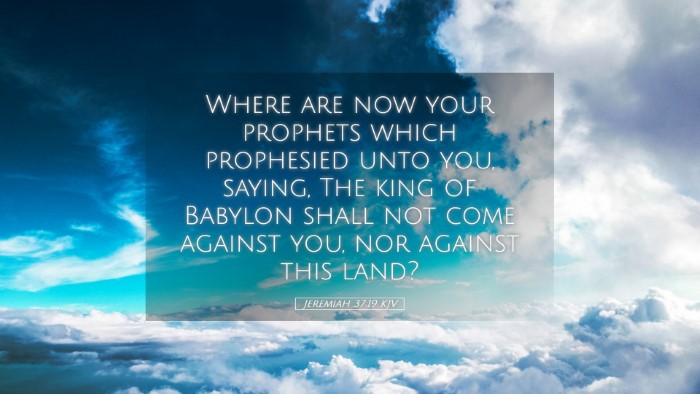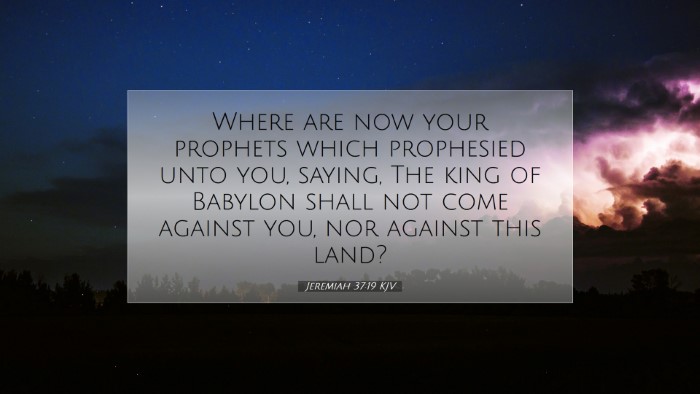Commentary on Jeremiah 37:19
Verse Context: Jeremiah 37:19 reads, “Where are now your prophets which prophesied unto you, saying, The king of Babylon shall not come against you, nor against this land?” This verse occurs during a tumultuous period in the history of Judah, as the kingdom finds itself under siege and the prophetic voice of Jeremiah stands in stark contrast to the false assurances provided by other prophets.
Historical Background
Understanding the historical context of Jeremiah is crucial. Jeremiah prophesied during the last days of Judah, a time marked by political intrigue and the impending Babylonian captivity. The nation faced spiritual decline, and the prophetic word was often suppressed in favor of more palatable messages that aligned with nationalistic hopes.
Insights from Matthew Henry
Matthew Henry emphasizes the inconsistency of the false prophets, whom he describes as having soothed the people with messages of peace despite the surrounding circumstances suggesting impending doom. He points to the folly in trusting these prophets over the true word of God spoken through Jeremiah.
- False Confidence: Henry notes how the false prophets instilled a misplaced confidence among the people, directly challenging Jeremiah's warnings.
- The Consequences of Deception: He discusses the ramifications of accepting such false prophecies, warning of the grave spiritual consequences that come with ignoring God's truth.
Insights from Albert Barnes
Albert Barnes provides a more exegetical approach, focusing on the rhetorical question posed by Jeremiah. He highlights the irony in the prophets' assurances against the evident threat posed by Babylon, illustrating a divide between divine revelation and human speculation.
- The Role of Prophecy: Barnes elaborates on the role of true prophets versus false prophets, underlining that authentic prophecy aligns with God's unfolding plan, even when it is unwelcome.
- The Consequence of Ignoring Real Warnings: He emphasizes how the populace's rejection of Jeremiah's message led to dire consequences for Judah, asserting the necessity of heeding God's voice.
Insights from Adam Clarke
Clarke’s commentary digs into the specific language used by Jeremiah, noting the significance of questioning the reliability of the former prophecies. He underscores that the power of God’s spoken word doesn’t waver in the face of contrary human assertions.
- The Certainty of God's Word: Clarke reiterates the permanence of divine proclamations, highlighting that God's purposes will prevail despite human opposition.
- Lessons for Modern Believers: His reflections urge the contemporary church to remain vigilant against the enticing words of false assurance that dilute the truth of scripture.
Theological Implications
Jeremiah 37:19 offers several theological implications for the church today:
- The Authority of Scripture: The text reaffirms the belief that scripture is the ultimate authority and that prophetic voices must be tested against it.
- Discernment in Leadership: The counsel here is vital for pastors and leaders; they need to appropriately discern the truth amid the cacophony of messages that vie for attention in today’s world.
- The Nature of True Prophecy: This verse prompts a reflective examination of what constitutes a true prophetic voice, urging believers to seek those who preach the gospel faithfully, even in challenging times.
Application for Pastors and Theologians
For pastors, this passage serves as a reminder of the gravity of their calling. They must not only declare what is comfortable but speak the whole counsel of God, even when it confronts popular opinion.
Theologians and students of the word are encouraged to explore the depth of divine justice and mercy illustrated in Jeremiah, acknowledging that while God’s righteousness may lead to judgment, His grace abounds for those willing to turn to Him.
Conclusion
In summary, Jeremiah 37:19 is a poignant reminder of the importance of heeding God’s true messages in a world filled with false assurances. The insights from the public domain commentaries of Henry, Barnes, and Clarke shed light on the enduring significance of this verse for contemporary Christianity, emphasizing discernment, the authority of God's word, and the essential nature of true prophecy.


